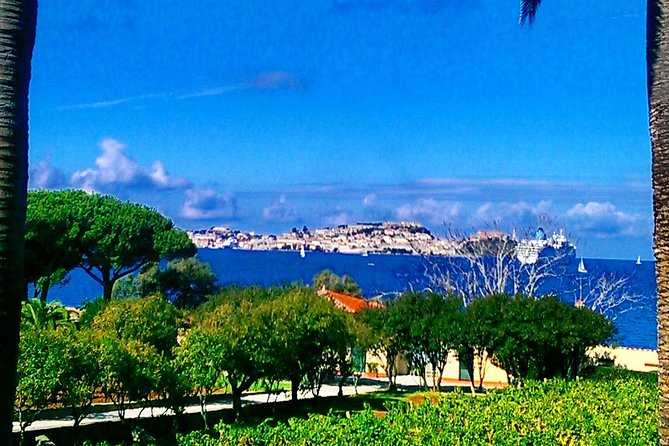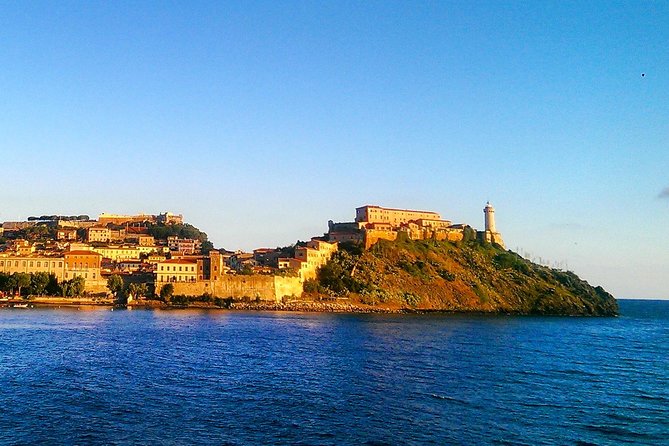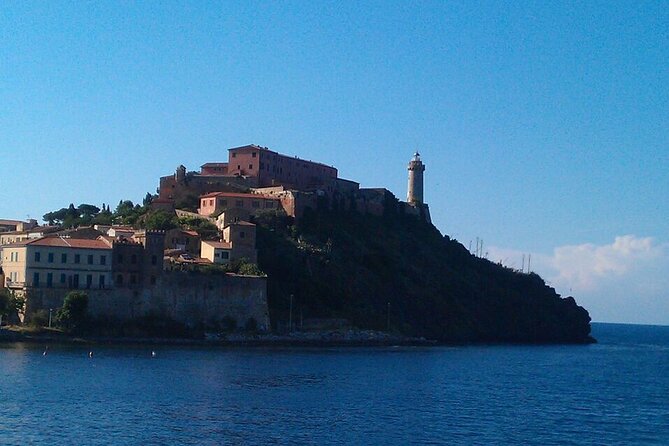Nestled on the picturesque island of Elba, Portoferraio boasts a captivating history that has unfolded over the centuries. From its humble beginnings as an Etruscan fishing village to its strategic importance for the Medici and Napoleonic regimes, this charming town has seen its fair share of illustrious inhabitants. Its well-preserved fortifications and architectural gems serve as a testament to the diverse cultures that have left their mark on this enchanting coastal enclave. Explore Portoferraio’s rich tapestry of history and discover how this small fishing village came to capture the attention of some of the most influential figures in European history.
Key Points

-
Portoferraio’s origins trace back to a 6th-century BC Etruscan fishing village, with archaeological evidence shedding light on their daily lives and rituals.
-
In the 16th century, Cosimo de Medici recognized Elba’s strategic importance, commissioning three fortresses to deter invaders and showcase Medici power.
-
Napoleon’s exile on Elba left a lasting impact, with the Church of San Giovanni Battista converted into a theater and his Villa dei Mulini preserved.
-
Portoferraio’s historic cityscape blends architectural styles, from the imposing Medici forts to the Napoleonic Theater and the charming fishing village of Marciana Marina.
-
Private cultural tours offer in-depth exploration of Portoferraio’s iconic landmarks, including the Medici forts, Napoleon’s residence, and the Medicean aqueduct showcasing engineering prowess.
Exploring Portoferraio’s Etruscan Roots

Although Portoferraio is widely known for its Medici and Napoleonic heritage, the city’s roots can be traced back to the Etruscan civilization.
Archaeological evidence suggests the Etruscans established a fishing village on the island of Elba as early as the 6th century BC. Remnants of Etruscan structures and artifacts can be found throughout the area, providing insight into the daily lives and rituals of this ancient culture.
Visitors can explore these sites, learning about the Etruscan influence on the region and how it paved the way for the later Medici and Napoleonic eras.
Uncovering Portoferraio’s Etruscan past offers a deeper understanding of the city’s rich and multifaceted history.
You can also read our reviews of more tours and experiences in Isola dElba.
Cosimo De Medici’s Fortified Stronghold
During the 16th century, Cosimo de’ Medici, the powerful ruler of the Florentine Republic, recognized the strategic importance of the island of Elba. He sought to fortify Portoferraio, the island’s largest city, to secure his control over the region.
Cosimo commissioned the construction of three formidable fortresses, including the impressive Forte Stella and Forte Falcone, which still stand today. These imposing structures not only deterred potential invaders but also served as a symbol of Medici power and influence.
Visitors can explore these remarkable historic sites, gaining insights into the political and military strategies that shaped Portoferraio’s past. The tour’s focus on these Medici-era fortifications provides a fascinating glimpse into the city’s rich history.
Napoleonic Influence in the City

Portoferraio’s deep connections to Napoleon Bonaparte’s exile on the island of Elba are evident throughout the city. One of the key Napoleonic sites is the Church of San Giovanni Battista, which Napoleon converted into a theater during his 10-month exile. Plus, his residence, the Villa dei Mulini, remains a popular attraction, showcasing the former emperor’s living quarters and personal belongings.
| Napoleonic Sites | Description |
|---|---|
| Church of San Giovanni Battista | Converted into a theater by Napoleon |
| Villa dei Mulini | Napoleon’s residence during his exile |
| Medici Fortifications | Integrated into Napoleon’s defensive strategies |
| Coastal Vistas | Inspired Napoleon’s fondness for the island |
Napoleon’s influence is deeply woven into Portoferraio’s historic fabric, offering visitors a unique glimpse into the city’s captivating past.
Magnificent Medici Forts and Bastions
Towering over Portoferraio, the Medici fortifications stand as powerful reminders of the city’s strategic importance.
Commissioned by Cosimo de’ Medici in the 16th century, the three imposing forts – Forte Falcone, Forte Stella, and Forte San Giacomo – were built to defend the island’s main port from naval attacks.
Visitors can explore the massive stone walls, towers, and bastions, which offer breathtaking views of the Tyrrhenian Sea.
These Medici masterpieces showcase the family’s architectural prowess and showcase Portoferraio’s rich military history.
The well-preserved forts provide a glimpse into the island’s past, allowing visitors to appreciate the engineering feats and defensive capabilities that made Portoferraio a formidable stronghold for centuries.
Napoleon’s Exile Residence and Legacy
Napoleon’s exile residence on the Isola d’Elba stands as a testament to the island’s pivotal role in the former emperor’s life.
This modest villa, nestled in the heart of Portoferraio, served as Napoleon’s home during his exile from 1814 to 1815. Visitors can explore the meticulously preserved interiors, imagining the day-to-day life of the once-powerful ruler.
Beyond the residence, the tour also highlights Napoleon’s lasting impact on the city, including a church he converted into a theater.
These historic sites provide a unique glimpse into the complex legacy of the Napoleonic era, offering a window into a captivating chapter of Portoferraio’s past.
- Portoferraio Walking Tour With Guide 2 Hours
- Excursion to the Blue Grotto on the Island of Elba by Sup and Canoe
- Guided Tour by E-Bike Rio Marina Mining Museum
- Excursion in the Crystalline Sea of the Island of Elba in Sup and Canoe
- Bike-Nic Half Day Tour to the Bunkers of Monte Enfola
- 2-Hour E-Bike Tour With Wine Tasting in Tenuta Delle Ripalte
Portoferraio’s Charming Historic Cityscape
Traversing the charming streets of Portoferraio, visitors are captivated by the city’s historic cityscape, a harmonious blend of architectural styles that reflect its storied past. From the imposing Medicean fortifications to the quaint fishing harbor, each corner reveals a new treasure. Enjoy the city’s vibrant culture by exploring its bustling piazzas, lined with cafes and boutiques.
| Historic Highlights | Notable Structures |
|---|---|
| Fortezza Vecchia | 16th century Medici Fortress |
| Cosimo I de’ Medici Residence | Renaissance Palace |
| Sanctuary of the Madonna of Monserrato | 16th century Church |
| Napoleonic Theater | Former Church Converted by Napoleon |
| Marciana Marina | Charming Fishing Village |
This walking tour allows visitors to uncover Portoferraio’s captivating past and appreciate the enduring spirit that has defined this remarkable island city.
Discovering Portoferraio’s Cultural Treasures
Beyond the charming streets and historic structures, Portoferraio’s cultural treasures await eager visitors. Uncover the island’s rich past on a private tour led by an art historian.
Explore two of the iconic Medici forts, marveling at the grand architecture commissioned by Cosimo de Medici. Visit a church transformed into a theater by Napoleon during his exile, then step inside his former residence.
With entrance fees included and a moderate fitness level required, this immersive experience promises to illuminate the city’s captivating blend of Etruscan, Medici, and Napoleonic influences.
Priced at $332.54 per group, the tour’s 4.5-star reviews attest to its exceptional quality and value.
As visitors wander through Portoferraio’s charming streets, they can’t help but be captivated by the city’s remarkable architectural marvels, each one a testament to the island’s rich history.
From the imposing Medici Forts that once guarded the harbor to the Medicean aqueduct, Portoferraio’s landmarks offer a glimpse into its storied past.
Key highlights include:
-
The Forte Stella, a 16th-century fortress designed by the renowned architect Giovan Battista Bellucci.
-
The Forte Falcone, another Medici-era fortification with breathtaking views of the Tyrrhenian Sea.
-
The Church of San Francesco, converted into a theater by Napoleon during his exile.
-
Villa dei Mulini, the former residence of Napoleon, now a museum showcasing his life on the island.
Frequently Asked Questions
Is the Tour Available Year-Round?
The tour is available year-round, though start times may vary by season. Visitors should check the tour schedule when booking to ensure the preferred timing is available.
What Is the Maximum Group Size for the Private Tour?
The private tour is limited to a maximum group size of 10 people. This private experience allows for a more personalized and intimate exploration of Portoferraio’s historic sites with an art historian guide.
Are There Any Discounts Available for Seniors or Students?
The tour does not currently offer discounts for seniors or students. However, the private group nature of the experience allows for some flexibility, so interested travelers should inquire about potential discounts when booking.
Can I Request a Different Starting Time for the Tour?
Yes, you can request a different starting time for the tour. The tour is available with both morning and afternoon start times, allowing for flexibility in scheduling your visit.
Are Audio Guides Available for Self-Guided Exploration?
The tour does not provide audio guides for self-guided exploration. However, visitors can explore Portoferraio on their own using downloadable maps and information from the local tourist office to discover the city’s historic sites.
The Sum Up
Portoferraio’s rich history, shaped by the Etruscans, Medici, and Napoleon, continues to captivate visitors. From its Etruscan roots to the Medici’s formidable fortifications and Napoleon’s lasting legacy, the town’s cultural treasures and architectural marvels offer a unique glimpse into its storied past. Exploring Portoferraio’s charming historic cityscape is a journey through centuries of strategic significance and enduring influence.
More Tour Reviews in Isola dElba
- 4-Hour Guided Tour on Amandolo Trail Zone & Elba Trail Area
- Private Sunset Tour in a Vintage Gozzo on Elba Island
- Winery Tour and Tasting With the Winemaker in Elba Island
- E-Bike Experience • Tour of Portoferraio by E-Bike
- Guided Cycle Tourism Wine Tour by E-Bike on the Island of Elba Arrighi
- 2-Hour E-Bike Tour With Wine Tasting in Tenuta Delle Ripalte
Not for you? Here's more things to do in Isola dElba we have recnetly reviewed
- 2 Best Canoe and Kayak Experiences in Isola Delba
- 4 Best Guided Tours in Isola Delba
- Double Dive Elba Island
- Discover Scuba Diving Baptism of the Sea in Half Day
- Aperitif at Ripalte for Sailors
- Half Day of Snorkeling and a Swim on Elba Island
- Elba Island Farmhouse Tasting Experience
- 13 Best Tours in Isola Delba
- 4-Hour Guided Tour on Amandolo Trail Zone & Elba Trail Area
- 2 Best 2 Hour Tours and Experiences in Isola Delba
- Winery Tour and Tasting With the Winemaker in Elba Island
- 5 Best Bike Tours in Isola Delba
